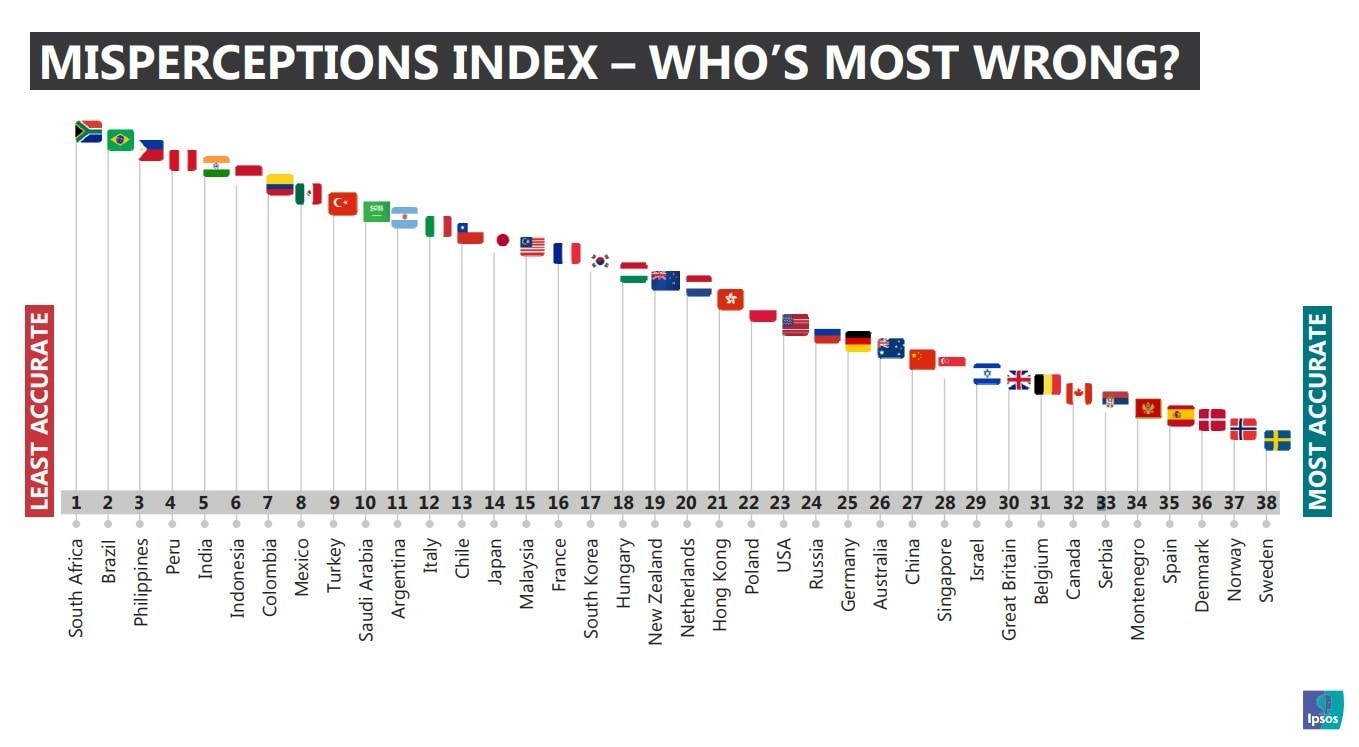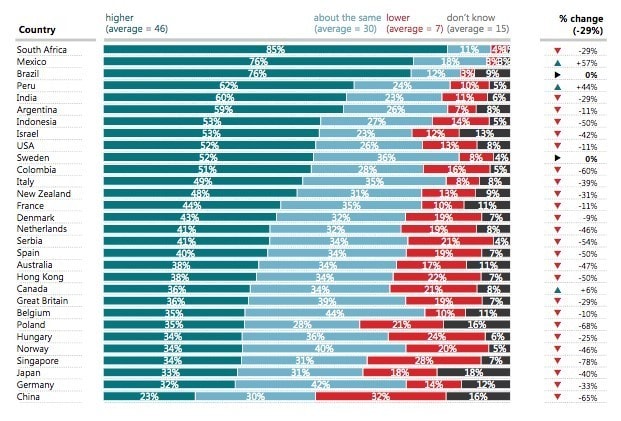Most people around the world are overly pessimistic

Our perception of our country's well being is probably wrong. Image: REUTERS/Stringer
Are you an optimist or a pessimist? Glass half-full or half-empty?
When it comes to discussing issues in wider society, most people across the globe tend to take an overly pessimistic view.

South Africans are, on average, most likely to think things are worse than they are, according to pollster Ipsos MORI’s latest “Perils of Perceptions” survey.
On issues ranging from murder rates to teen pregnancies, survey respondents from South Africa were likely to give the least accurate guesses of where the figures stood.
South Africa takes over the dubious honour of being the most needlessly gloomy from India, which topped the 2016 survey, and this year appears in fifth place.
Brazil, the Philippines and Peru make up the rest of the five least accurate nations when considering social issues, while respondents from Sweden, Norway and Denmark were most accurate.
Murder rate

South Africans were particularly pessimistic when considering the murder rate in their country.
Those taking part in Ipsos MORI’s survey were asked whether they thought the murder rate in their country was higher, lower, or about the same as it was in 2000.
Respondents from South Africa topped the pessimism ranks, with 85% believing the murder rate was higher when it had actually fallen 29%.
This pessimism over murder rates is a global trend: only 7% of people think the murder rate is lower in their country than it was in 2000.
However, it is actually significantly down in most countries, and on average down 29% across all 38 countries featured in the survey.
Terror attacks

Less than a fifth of people surveyed – just 19% – thought deaths from terrorist attacks in their countries were lower in the last 15 years than they were in the 15 years before the 9/11 attacks on New York in 2001.
However, terror-related deaths are significantly down across most of the countries featured in the survey, and overall they are around half the level they were.
Deaths had risen in some countries that suffered high-profile Islamist terror attacks, such as France and Belgium.
But in other countries that experienced high-profile attacks, such as Britain and Spain, the number of deaths caused by Islamist terror groups in the last 15 years is significantly lower than the number of people killed by the IRA and ETA respectively in the 15 years prior to 2001.
Spanish respondents were more accurate than their British counterparts in estimating this decline, with 37% saying there were fewer deaths from terror attacks and 29% saying there were more.
British respondents were more pessimistic: 47% though there were more deaths, and only 15% thought there were fewer.
In reality, there were 311 deaths from terror attacks in Britain between 1985 and 2000, and 62 deaths between 2002 and 2016.
Immigrant prisoners

People hugely overestimate the proportion of prisoners in their countries who are immigrants: the average guess is 28%, when it’s actually 15%.
In the Netherlands the average guess is that more than half of all prisoners are immigrants, when it is actually less than a fifth.
There is a similar overestimation in South Africa, France and the US.
Americans think that foreign-born criminals make up 32% of the prison population, when the real figure is just 5.2%.
However, in Saudi Arabia the proportion of foreign-born prisoners is greatly underestimated. The average guess was 26%, but the actual figure is 72%.
Teenage births

Teenage pregnancies and births proved to be the social issue on which survey respondents were least accurate – and most pessimistic – in their estimates.
All countries overestimate teenage births, and some do so by a huge margin. For example, in Brazil, the average guess is that 48% of 15-19-year-old women and girls give birth each year when it is actually 6.7%.
The other Latin American countries were similarly high in their overestimations, particularly Colombia, Mexico and Peru.
South Africans were similarly incorrect with an average guess of 44%, when the actual figure is just a tenth of that.
Even those who are closest still overestimate the extent of the issue: for example, Denmark and Norway both guess a teenage birth rate of 8%, but the actual figures are 0.4% and 0.6% respectively.
Health rating

To explore the gap in perceptions of health, Ipsos MORI asked survey respondents to say what they thought their fellow citizens reported their health as, and then how they felt about their own health.
It revealed that with the exception of Japan, the Philippines and Peru, in every country respondents thought their fellow citizens would be less likely to report their health as good than they themselves reported it to be.
In South Korea, the average guess is that 39% of people rate their own health as good or very good, but when asked themselves, 80% of South Koreans report good or very good health. A similar pattern was found in New Zealand and Malaysia.
The only country to greatly overestimate self-reported health was Japan. The average guess was 47%, but when asked themselves only 35% reported good or very good health.
Don't miss any update on this topic
Create a free account and access your personalized content collection with our latest publications and analyses.
License and Republishing
World Economic Forum articles may be republished in accordance with the Creative Commons Attribution-NonCommercial-NoDerivatives 4.0 International Public License, and in accordance with our Terms of Use.
The views expressed in this article are those of the author alone and not the World Economic Forum.
Stay up to date:
Social Protection
Forum Stories newsletter
Bringing you weekly curated insights and analysis on the global issues that matter.
More on Global CooperationSee all
Sebastian Buckup and Maximilian Martin
November 13, 2025






